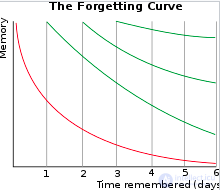Lecture
The forgetting curve or the Ebbingauz curve was obtained as a result of the experimental study of memory by the German psychologist Hermann Ebbingauz in 1885.
Ebbinghaus was fascinated by the idea of studying "pure" memory - memorization, which is not affected by the processes of thinking. To do this, he proposed a method for memorizing meaningless syllables consisting of two consonants and a vowel between them that do not cause any semantic associations (for example, bov , gis , loch , etc.) [1] .
During the experiments, it was found that after the first unmistakable repetition of a series of such syllables, forgetting goes very quickly at first. Already within the first hour, up to 60% of all received information is forgotten, 10 hours after memorizing, 35% of the studied one remains in memory. Further, the process of forgetting is slow and after six days about 20% of the total number of originally learned syllables remain in memory, the same amount remains in memory after a month.
Conclusions that can be made on the basis of this curve is that in order to effectively memorize it is necessary to repeat the memorized material.
Psychologists advise do a few reps. Repeat Mode:
If you have two days
the first repetition - immediately after reading;
the second repetition - 20 minutes after the first repetition;
the third repetition - 8 hours after the second;
the fourth repetition - 24 hours after the third.
If you need to remember for a very long time
Meaningful memorization is 9 times faster than mechanical memorization (in his experiments, Ebbingauz memorized the text of Don Juan by Byron and an equal in list list of meaningless syllables) [1] .
Ebbinghaus also owns the discovery of the edge effect - a phenomenon that shows that the material at the beginning and at the end is best remembered.

Comments
To leave a comment
General psychology
Terms: General psychology